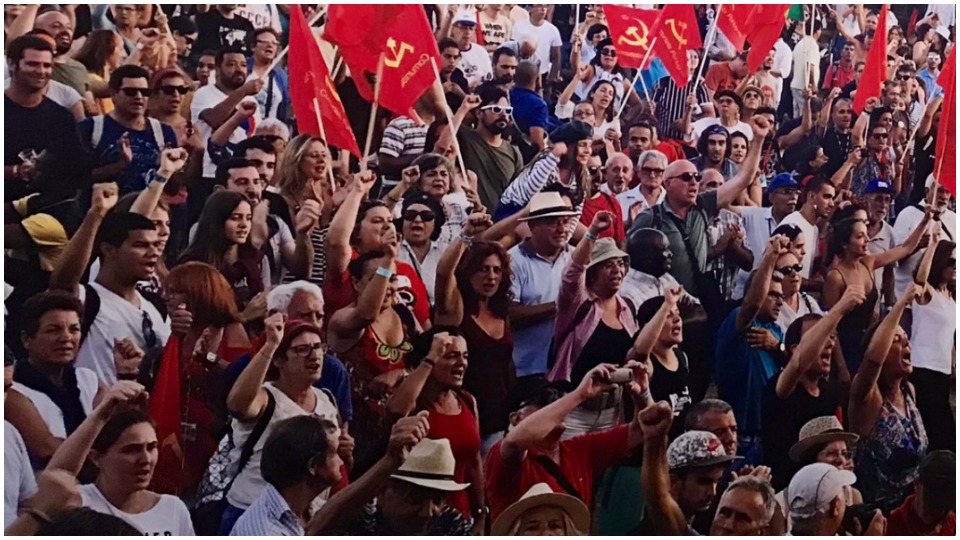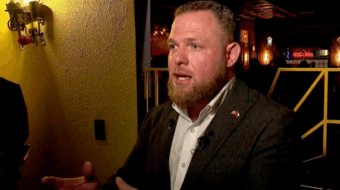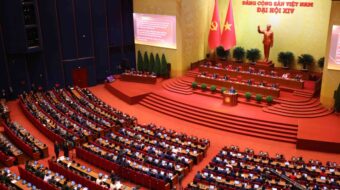
LISBON, Portugal—Mainstream TV and newspapers, coordinated attacks on social media, and huge amounts of corporate money are all prominent features of a campaign underway in this country to reduce the size of the Communist Party (PCP) vote in the coming parliamentary elections on Oct. 6.
The economic powers-that-be, largely because of the work of the working-class-based PCP in this country, recognize that there is decreased support for the main right-wing party, the misnamed Social Democratic Party (SDP). Much of Portugal’s big business establishment is supporting instead the country’s Socialist Party which has always been an actual social democratic party that itself has moved increasingly to the right.
To understand the unique situation in Portuguese politics and why Portugal’s 2019 elections are as critical to the future of this country as are the 2020 elections to the future of the United States, it is necessary to look back at the Portuguese elections of 2015.
At that time, the right-wing parties combined, led by the SDP, won a plurality of the parliamentary vote and declared they were forming a government that would continue their rule of austerity and curbing of workers’ rights. The PCP, however, used a democratic feature of Portugal’s constitution to say, “Not so fast!” That special feature of its constitution was actually put forward by the PCP in the immediate period after the overthrow of the fascist dictatorship in 1974.

The PCP went to the Socialist Party and urged it to form a minority government with itself in the lead. Everyone knew that the right wing would challenge that government for not having a majority in parliament, but the PCP offered to use its votes and the votes of smaller left parties in the parliament which, when combined with the Socialist votes, would prevent the right wing from kicking out the Socialist minority government.
In exchange for this “deal,” the Communists insisted on Socialist Party support for a number of important gains for Portuguese workers, including a hike in the minimum wage, drastically reduced costs for public transport, free textbooks in the public schools, reduced taxes and restrictions on small and micro-businesses, and improvements in environmental policy at government enterprises, among other things.
“This was a limited agreement,” Albano Nunes, a member of the Central Control Commission of the PCP, told People’s World in an exclusive interview Sunday. “We never discussed with them the things we knew they would never change, including their support for the European Union and its forced austerity policies on Portugal, the use of the Euro to dominate our economy, their support for NATO and its militarism, among other things.”
“Some say we should regret what we did by engaging with other political forces…but we have no regrets. We are the party of the working class, and whatever the workers need is more important to us than our own immediate electoral fortunes. The elections are important, but for us, the needs of the workers always come first.”
The Portuguese Communists made the agreement because, without joining formally into a coalition with a party shackled to the EU and NATO, they were able to force that party to back some measures that were critically important to the country’s workers.

Jerónimo de Sousa, the PCP’s general secretary, said Friday that the Socialist Party, if it wins a clear majority in parliament, cannot be counted on to continue or expand any of the pro-worker policies put forward by the PCP in 2015.
“They have instituted and backed precarious work policies that are unacceptable to our workers, and they have given big amounts of money to our banks,” he declared. He was referring to Socialist Party support for anti-labor laws, including ones that extend the period for which employers can keep people on probation, and to government use of taxpayer funds to bail out financially failing banks.
He explained that a large Communist vote was necessary to prevent the Socialist Party from gaining the clear majority it is seeking. If it achieves that goal, it will not need the support of the Communists to keep it in power in Parliament and Portugal’s workers will lose the leverage they now have in that body with the PCP.
“The way forward is to build the largest vote possible for the PCP,” he declared Friday at the opening rally of the 43rd annual Avante! Festival in Seixal, a district just outside of Lisbon. “Many times they have declared us dead, but here we are alive and well,” he said to the cheers of thousands of party militants gathered around him. The event is named for Avante!, the official newspaper of the PCP.
Similar to many of the famous Portuguese festivals, the Avante! Festival featured food, music, drinking, partying, and shows, but this festival had both an unmistakable proletarian character and political content. Present at the festival were the workers at a huge Volkswagen plant, for example, where hundreds of workers are members of the PCP. They had a large and popular booth at the event.
The festival is only one of many things the party membership is doing in the leadup to the Oct. 6 elections. They are holding rallies at workplaces, marches in the streets, gatherings on street corners in the municipalities, and door-to-door canvassing, in addition to fighting back on social media.
The PCP is in coalition in numerous districts with the smaller Green Party, with members of both parties campaigning for joint slates. Smaller “ultra-left” bloc parties like the Trotskyists, they note, are hoping to gain votes for themselves but are not working in the coalition effort to ensure larger votes for the PCP. Party members here see those groups as obstructive and opportunistic.
There is worry in the PCP about the campaign against it and about what might happen on Oct. 6. “This is not just another election,” de Sousa said at a meeting Sunday with international guests at the Avante! Festival. He warned that “the aim of capital is to privatize everything, strike stronger blows against social security, and deregulate everything. They are angry that we were an impediment four years ago to their achievement of these aims, and our response has to be to strengthen and reinforce the PCP. To this end,” he said, “in the period leading up to this festival, we have recruited 1,000 new people into the party.”

Ironically, it is the success of the PCP after the 2015 elections in winning some important gains for workers that is contributing to at least some of the problems the party is having right now. The Socialist Party is using its support for measures it did not originally favor at all, measures the PCP forced it to back, as evidence that giving it, the Socialist Party, a clear majority in the Parliament is the best thing for workers right now.
If the recent municipal elections are any indication, that Socialist Party tactic might be working. Going into the recent municipal elections, the PCP controlled 34 of the important municipalities in Portugal. They lost 10 and now control 24.
“Some say we should regret what we did by engaging with other political forces the way we did,” Nunes said. “But we have no regrets. We are the party of the working class and whatever the workers need is more important to us than our own immediate electoral fortunes. Yes, the elections are important but, for us, the needs of the workers always come first.”










